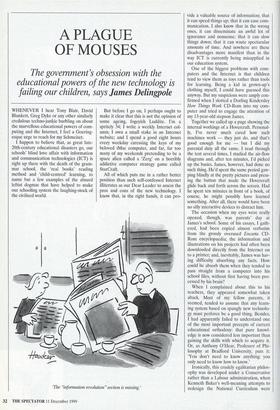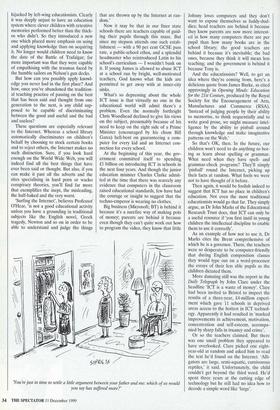A PLAGUE OF MOUSES
The government's obsession with the educational powers of the new technology is failing our children, says James Delingpole
WHENEVER I hear Tony Blair, David Blunkett, Greg Dyke or any other similarly credulous techno-junkie burbling on about the marvellous educational powers of com- puting and the Internet, I feel a Goering- esque urge to reach for my Schmeiser.
I happen to believe that, as great late- 20th-century educational disasters go, our schools' blind love affair with information and communication technologies (ICT) is right up there with the death of the gram- mar school, the 'real books' reading method and 'child-centred' learning, to name but a few examples of the absurd leftist dogmas that have helped to make our schooling system the laughing-stock of the civilised world. But before I go on, I perhaps ought to make it clear that this is not the opinion of some ageing, fogeyish Luddite. I'm a spritely 34; I write a weekly Internet col- umn; I own a small stake in an Internet website; and I spend a good eight hours every weekday caressing the keys of my beloved iMac computer, and far, far too many of my weekends pretending to be a space alien called a 'Zerg' on a horribly addictive computer strategy game called StarCraft.
All of which puts me in a rather better position than such self-confessed Internet illiterates as our Dear Leader to assess the pros and cons of the new technology. I know that, in the right hands, it can pro- 'The "information revolution" section is missing.' vide a valuable source of information; that it can speed things up; that it can ease com- munication. I also know that in the wrong ones, it can disseminate an awful lot of ignorance and nonsense; that it can slow things down; that it can waste spectacular amounts of time. And nowhere are these disadvantages more manifest than in the way ICT is currently being misapplied in our education system.
One of the biggest problems with com- puters and the Internet is that children tend to view them as toys rather than tools for learning. Being a kid in grown-up's clothing myself, I could have guessed this anyway. But my suspicions were amply con- firmed when I slotted a Dorling Kindersley How Things Work CD-Rom into my com- puter and tried to engage the attention of my 13-year-old stepson James.
Together we called up a page showing the internal workings of a Hovercraft. Personal- ly, I've never much cared how such machines work — they just do, and that's good enough for me — but I did my parental duty all the same. I read through the text several times, I studied the air-flow diagrams and, after ten minutes, I'd picked up the basics. James, however, had done no such thing. He'd spent the same period gaw- ping blindly at the pretty pictures and press- ing the button that made the Hovercraft glide back and forth across the screen. Had he spent ten minutes in front of a book, of course, he might possibly have learned something. After all, there would have been no silly interactive devices to distract him.
The occasion when my eyes were really opened, though, was parents' day at James's school. Some of his essays, I gath- ered, had been copied almost verbatim from the grossly overused Encarta CD- Rom encyclopaedia; the information and illustrations on his projects had often been downloaded directly from the Internet on to a printer; and, inevitably, James was hav- ing difficulty absorbing any facts. How could he absorb them when they tended to pass straight from a computer into his school files, without first having been pro- cessed by his brain?
When I complained about this to his teachers, they appeared somewhat taken aback. Most of my fellow parents, it seemed, tended to assume that any learn- ing system based on spangly new technolo- gy must perforce be a good thing. Besides, I had apparently failed to understand one of the most important precepts of current educational orthodoxy: that pure knowl- edge is now considered less important'than gaining the skills with which to acquire it. Or, as Anthony O'Hear, Professor of Phi- losophy at Bradford University, puts it: 'You don't need to know anything; you only need to know how to know.'
Ironically, this crudely egalitarian philos- ophy was developed under a Conservative rather than a Labour administration, when Kenneth Baker's well-meaning attempts to redesign the National Curriculum were hijacked by left-wing educationists. Clearly it was deeply unjust to have an education system where clever children with retentive memories performed better than the thick- os who didn't. So they introduced a new one which placed more emphasis on using and applying knowledge than on acquiring it. No longer would children need to know the date of the Battle of Trafalgar; far more important was that they were capable of empathising with the traumas faced by the humble sailors on Nelson's gun decks.
But how can you possibly apply knowl- edge you never had in the first place? And how, once you've abandoned the tradition- al teaching practice of passing on the best that has been said and thought from one generation to the next, is any child sup- posed to be capable of discriminating between the good and useful and the bad and useless?
These questions are especially relevant to the Internet. Whereas a school library automatically discriminates on children's behalf by choosing to stock certain books and to reject others, the Internet makes no such distinction. Sure, if you look hard enough on the World Wide Web, you will indeed find all the best things that have ever been said or thought. But also, if you can make it past all the adverts and the sites specialising in hard porn or wacko conspiracy theories, you'll find far more that exemplifies the inept, the misleading, the half-baked and the very worst.
'Surfing the Internet', believes Professor O'Hear, 'is not a good educational activity unless you have a grounding in traditional subjects like the English novel, Greek tragedy, Newton and so on in order to be able to understand and judge the things that are thrown up by the Internet at ran- dom.'
Now it may be that in our finer state schools there are teachers capable of guid- ing their pupils through this maze. But since my stepson attends one such estab- lishment — with a 90 per cent GCSE pass rate, a public-school ethos, and a splendid headmaster who reintroduced Latin to his school's curriculum — I wouldn't bank on it. If young James is allowed to abuse ICT at a school run by bright, well-motivated teachers, God knows what the kids are permitted to get away with at inner-city sinks.
What's so depressing about the whole ICT issue is that virtually no one in the educational world will admit there's a problem. Even the normally forthright Chris Woodhead declined to give his views on the subject, presumably because of his need to keep on the right side of a Prime Minister (encouraged by his chum Bill Gates) hell-bent on guaranteeing a com- puter for every kid and an Internet con- nection for every school.
At the beginning of this year, the gov- ernment committed itself to spending E1 billion on introducing ICT in schools in the next four years. And though the junior education minister Charles Clarke admit- ted at the time that there was scarcely any evidence that computers in the classroom raised educational standards, few have had the courage or insight to suggest that the techno-emperor is wearing no clothes.
Big business (Microsoft; BT) is behind it because it's a surefire way of making pots of money; parents are behind it because even though they can't quite work out how to program the video, they know that little 'You're just in time to settle a little argument between your father and me: which of us would you say has suffered more?' Johnny loves computers and they don't want to expose themselves as fuddy-dud- dies; head teachers are behind it because they know parents are now more interest- ed in how marry computers there are per pupil than how many books are in the school library; the good teachers are behind it because it's inevitable; the bad ones, because they think it will mean less teaching; and the government is behind it because Tony is.
And the educationists? Well, to get an idea where they're coming from, here's a delicious quote from James Burke, as cited approvingly in Opening Minds: Education for the 21st Century, produced by the Royal Society for the Encouragement of Arts, Manufactures and Commerce (RSA). `Instead of judging people by their ability to memorise, to think sequentially and to write good prose, we might measure intel- ligence by the ability to pinball around through knowledge and make imaginative patterns on the Web.'
So that's OK, then. In the future, our children won't need to do anything so bor- ing as learn about spelling or grammar. What need when they have spell- and grammar-check programs? They'll simply 'pinball' round the Internet, picking up their facts at random. What fools we were not to have thought of it before.
Then again, it would be foolish indeed to suggest that ICT has no place in children's education. Not even the most traditional educationists would go that far. They simply argue, as Dr John Marks of the Educational Research Trust does, that ICT can only be a useful resource if 'you first instil in young children the intellectual discipline to enable them to use it correctly'.
As an example of how not to use it, Dr Marks cites the Brent comprehensive of which he is a governor. There, the teachers were so desperate to be computer-friendly that during English composition classes they would type out on a word-processor the essays of their less able pupils as the children dictated them.
More damning still was the report in the Daily Telegraph by John Clare under the headline 'ICT is a waste of money'. Clare had been invited to Bristol to inspect the results of a three-year, £4-million experi- ment which gave 11 schools in deprived areas access to the hottest in ICT technol- ogy. Apparently it had resulted in 'marked improvements in achievement, motivation, concentration and self-esteem, accompa- nied by sharp falls in truancy and crime'.
Or so the teachers claimed. But there was one small problem they appeared to have overlooked. Clare picked one eight- year-old at random and asked him to read the text he'd found on the Internet. 'Alli- gators are large, semi-aquatic, carnivorous reptiles,' it said. Unfortunately, the child couldn't get beyond the third word. He'd spent three years at the cutting edge of technology but he still had no idea how to decode a simple word like 'large'.



























































































 Previous page
Previous page